Unit 3 Tomorrow’s world Grammar and usage(1) 被动语态课件(35张)
文档属性
| 名称 | Unit 3 Tomorrow’s world Grammar and usage(1) 被动语态课件(35张) | 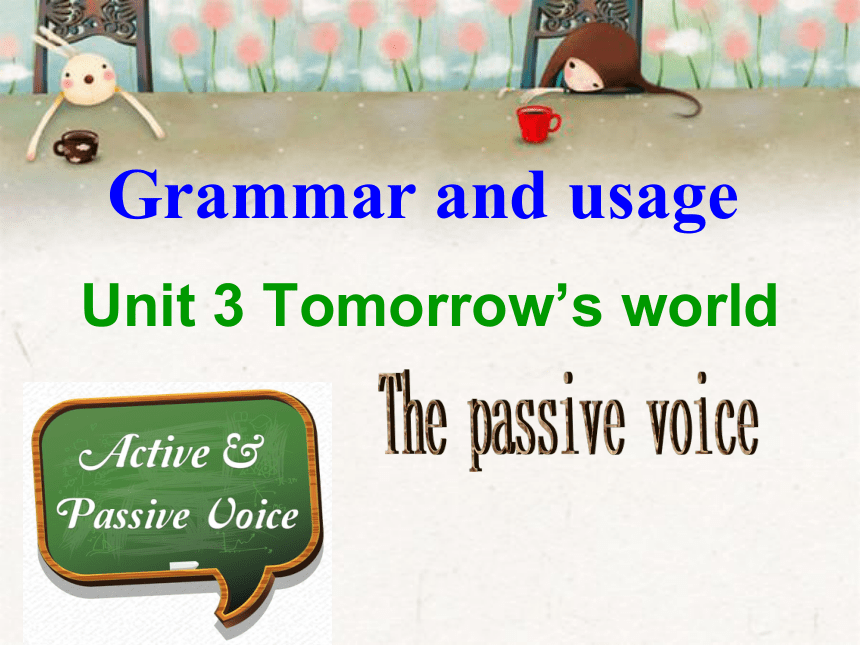 | |
| 格式 | zip | ||
| 文件大小 | 1.2MB | ||
| 资源类型 | 教案 | ||
| 版本资源 | 牛津译林版 | ||
| 科目 | 英语 | ||
| 更新时间 | 2019-07-25 22:59:09 | ||
图片预览


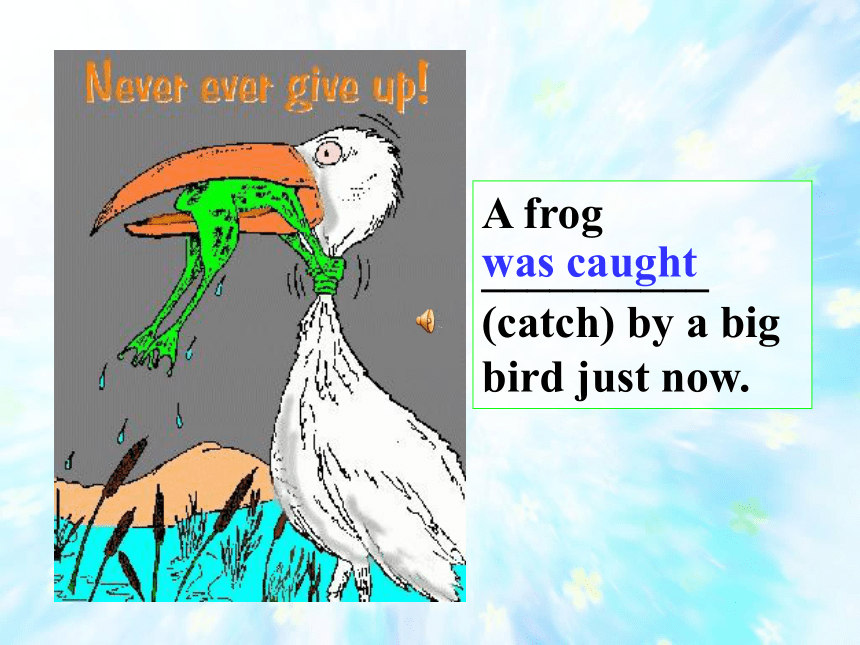
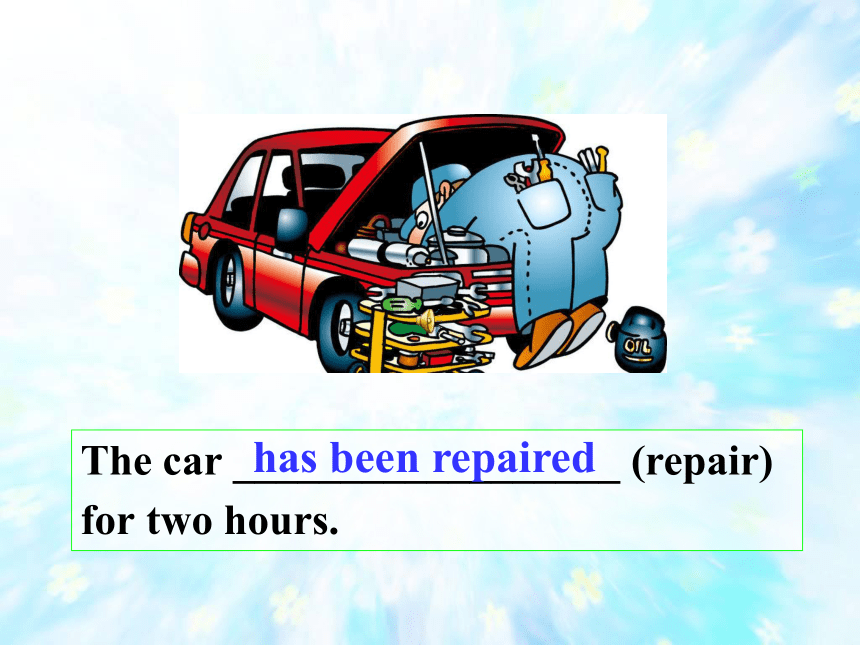


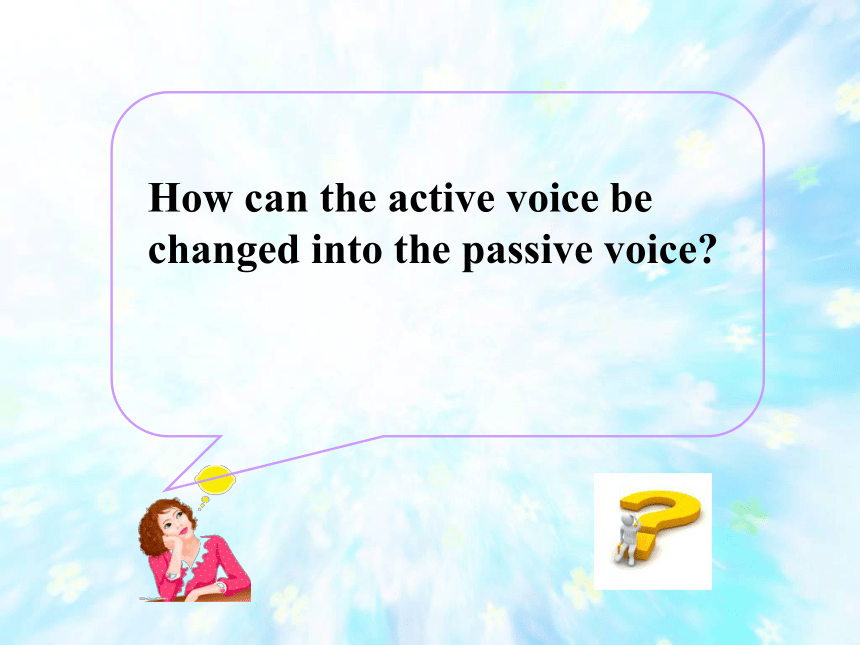
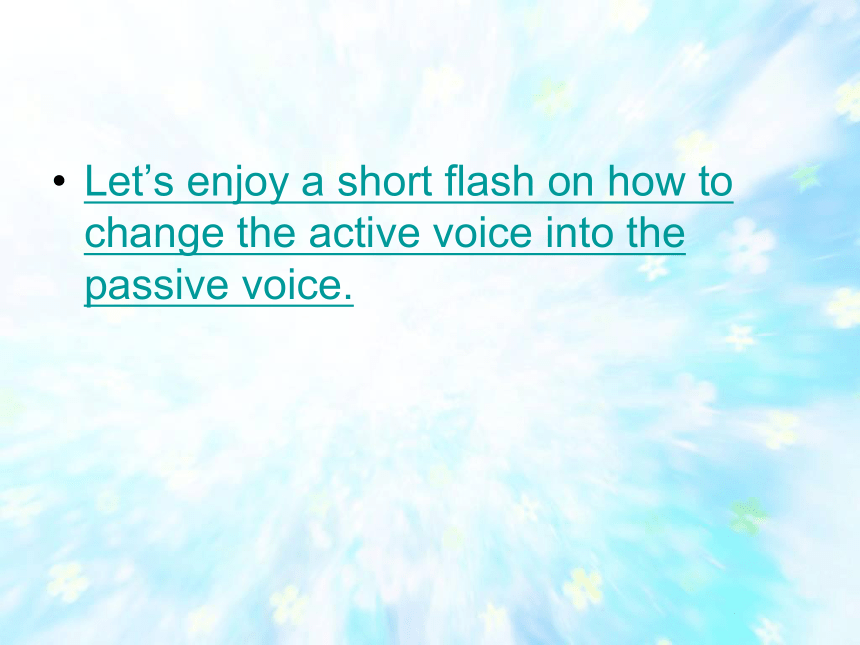
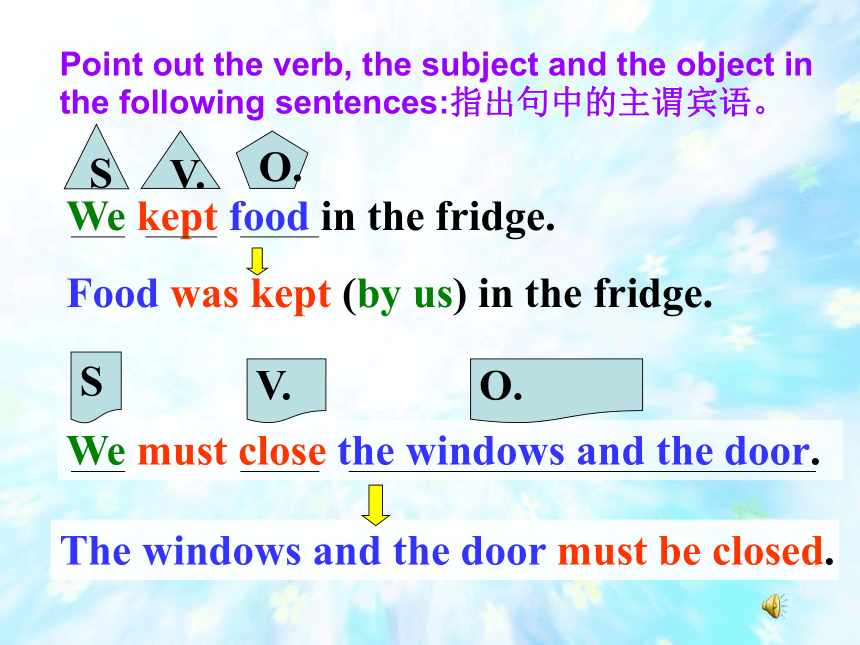
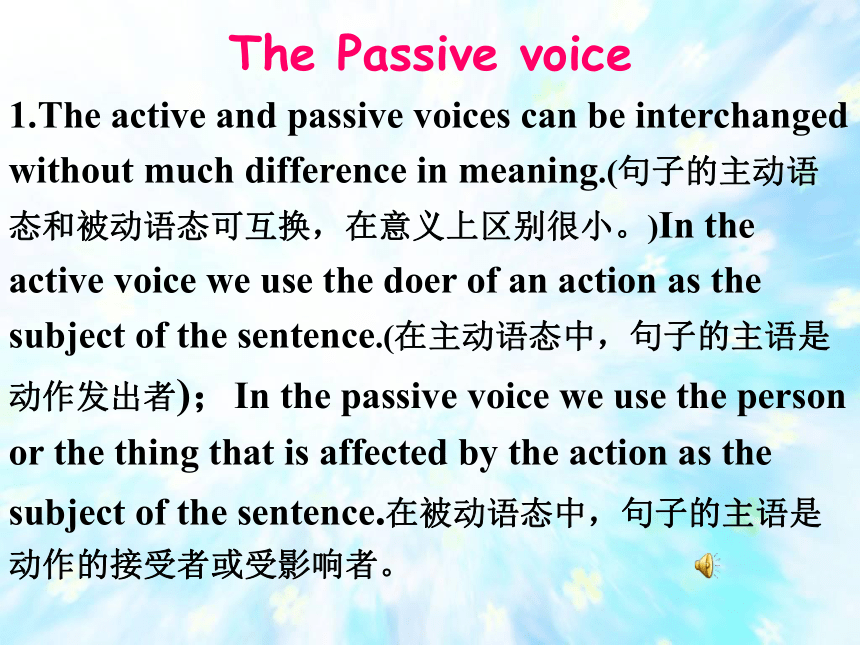
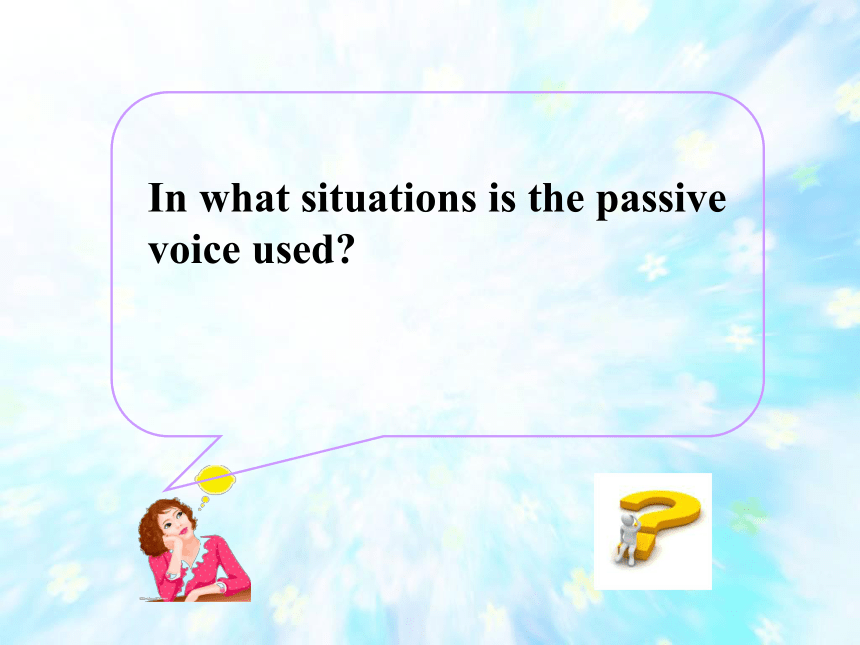
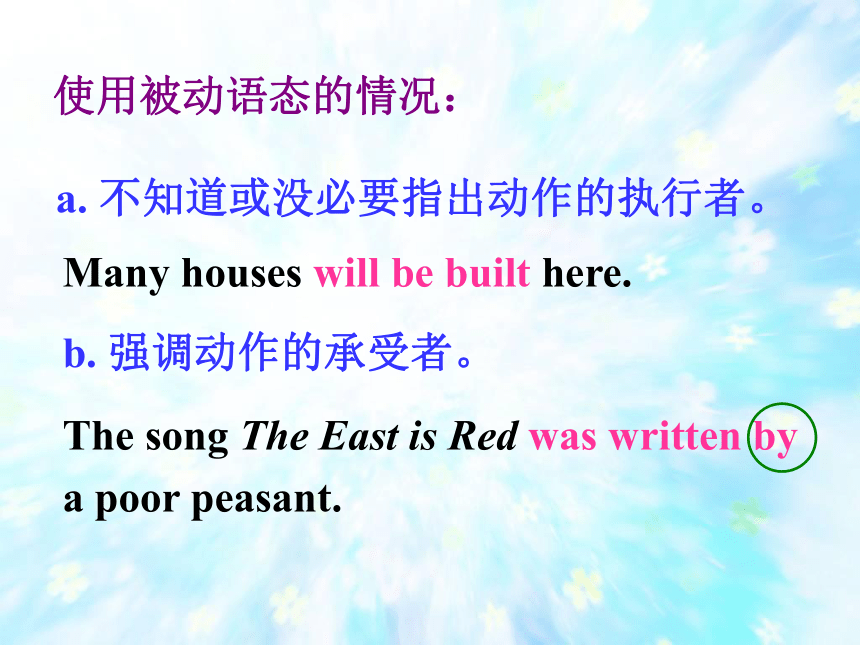
文档简介
课件35张PPT。Unit 3 Tomorrow’s world Grammar and usage The passive voiceThe man _______ (call) “A good husband”.is calledFill in the blanks according to the pictures.A frog __________ (catch) by a big bird just now.was caughtThe?car?__________________ (repair)?
for?two?hours. has?been?repaired The pet dog _______________ (treat) by a vet. is being treatedA new building ____________ (build) here soon.will be built?How can the active voice be changed into the passive voice? Let’s enjoy a short flash on how to change the active voice into the passive voice.Point out the verb, the subject and the object in the following sentences:指出句中的主谓宾语。We kept food in the fridge.We must close the windows and the door.S V.O.SV.O. Food was kept (by us) in the fridge.The windows and the door must be closed.The Passive voice1.The active and passive voices can be interchanged without much difference in meaning.(句子的主动语态和被动语态可互换,在意义上区别很小。)In the active voice we use the doer of an action as the subject of the sentence.(在主动语态中,句子的主语是动作发出者);In the passive voice we use the person or the thing that is affected by the action as the subject of the sentence.在被动语态中,句子的主语是动作的接受者或受影响者。In what situations is the passive voice used? 使用被动语态的情况:Many houses will be built here.The song The East is Red was written by a poor peasant.a. 不知道或没必要指出动作的执行者。b. 强调动作的承受者。The plan was supported by those who wished to have more chances to speak English.
You are requested to attend the meeting.c. 动作的执行者有较长的修饰语。d. 出于礼貌,不愿意说出动作执行者。 被动语态由助动词be+过去分词构成,时态通过be表现出来。Let’s enjoy a short flash on different
tenses of the passive voice.The passive voicebe+ done am/is/are
一般现在时 am/is/are + being
现在进行时shall/will + be
一般将来时have/has + been
现在完成时被动语态的构成 be+ done was/were
一般过去时 was/were+being
过去进行时would+be
过去将来时had+been
过去完成时Fill in the blanks with the right form of the words given:I __________ (give) a new book by my father on my birthday.
English __________ (find) very useful.
3. The work ______________ (finish)
tomorrow.
4. The flowers _______________ (water) by them now.was given is foundwill be finished are being watered5. The railway ______________ (build) this time last year.
6. The new railway ____ already _________ (build).
7. The new railway ____________ (build) by the end of last year.
8. He told me the sports meeting _____________ (hold) the next month.
9. Rice ________ (grow) in the south of the States.was being builthas been builthad been builtwould be held is grown3.在用被动语态时还要注意一下几点:
a. We usually use by to introduce the doer of the action, but we usually don’t mention the doer when it is not necessary or not important, or when it difficult to say who the doer is.(在被动语态中,动作发出者往往置于by之后,但在不必指出动作发出者是谁、动作发出者并不重要或很难指出动作发出者是谁时,一般不提及动作发出者。)
e.g. Both the headsets and the gloves are
connected to a computer network. b. Verbs like give, lend, offer, send, tell and show can be followed by two objects which usually refer to a person and a thing respectively. When we change sentences with these verbs into the passive voice, we usually use the person as the subject. Sometimes we also use the thing as the subject. (在give, lend, offer, send, tell和show等动词后,常带两个宾语,分别指人和物,变为被动语态时,常用指人的宾语做句子的主语,也可用指物的宾语做句子的主语,但需在人前加介词to)e.g. Our teacher often tells us some interesting
stories in English.
We are often told some interesting stories
in English.
Some interesting stories are often told to
us in English. The government has given much food to the people in the poor area.The people in the poor area has been given much food.
Much food has been given to the people in the poor area.c. In the active voice , some verbs are followed by an object and a bare infinitive. In the passive voice, we change the bare infinitive into the to infinitive.在主动语态中,有些动词后(使役动词和感官动词)常接宾语和不带to的动词不定式,在被动语态中,则使用带to的动词不定式。
e.g.
1. I often hear the girl play the piano in the
afternoon.
The girl is often heard to play the piano in
the afternoon.
2. He let me go first.
→ I was let to go first.主动语态:
make/let/have/see/hear sb do sth
被动语态:
sb be made/let/had/seen/heard to do sthd. Sometimes we use get instead of be in the passive voice(在被动语态中,有时get可用来代替be),如get changed、get dressed和get hurt等。
e.g. My bike got stolen last night.
You’d better get changed quickly, as
the party will begin soon.e. Some verbs can be used in the active form with a passive meaning.(有些动词可用主动语态形式来表示被动意义)。
e.g. This sweater washes well.
The pen writes smoothly.
The kind of computer sells well in China.f. Some verbs cannot be used in the passive voice(表示状态的动词如 fail, suit, contain, own, hold, fit, cost, lack, become, have, and feel等不能用被动语态。)
e.g. I like pop songs and often listen to them.
He has a big house near the river.
You can depend on her to deal with the
situation.Special passive patterns(一些特殊的被动语态句型):
It + passive verb + that clause
It+动词的被动语态形式+that引导的从句
e.g. It is said that he will recover soon.
Subject + passive verb + to infinitive
主语+动词的被动语态形式+动词不定式 It is said that Li Ping will study abroad.Li Ping is said to study abroad. It is said that Li Ping is studying abroad.Li Ping is said to be studying abroad.Li Ping is said to have studied abroad. It is said that Li Ping studied abroad.Verbs often used in these patterns are:(常用于这类句型的动词有)say, believe, report,
suppose, know和prove等.
It is said that …
It is reported that …
It is hoped that …
It is well known that …
It is believed that …
It must be pointed out that …More examples:Please write as many passive voice sentences as possible, then read them to the class loudly.Summary and Homework1. Sum up this lesson if possible.
2.Set the homework.
a. Review what we learned today.
b. Finish exercises on page 49.Thank you!
for?two?hours. has?been?repaired The pet dog _______________ (treat) by a vet. is being treatedA new building ____________ (build) here soon.will be built?How can the active voice be changed into the passive voice? Let’s enjoy a short flash on how to change the active voice into the passive voice.Point out the verb, the subject and the object in the following sentences:指出句中的主谓宾语。We kept food in the fridge.We must close the windows and the door.S V.O.SV.O. Food was kept (by us) in the fridge.The windows and the door must be closed.The Passive voice1.The active and passive voices can be interchanged without much difference in meaning.(句子的主动语态和被动语态可互换,在意义上区别很小。)In the active voice we use the doer of an action as the subject of the sentence.(在主动语态中,句子的主语是动作发出者);In the passive voice we use the person or the thing that is affected by the action as the subject of the sentence.在被动语态中,句子的主语是动作的接受者或受影响者。In what situations is the passive voice used? 使用被动语态的情况:Many houses will be built here.The song The East is Red was written by a poor peasant.a. 不知道或没必要指出动作的执行者。b. 强调动作的承受者。The plan was supported by those who wished to have more chances to speak English.
You are requested to attend the meeting.c. 动作的执行者有较长的修饰语。d. 出于礼貌,不愿意说出动作执行者。 被动语态由助动词be+过去分词构成,时态通过be表现出来。Let’s enjoy a short flash on different
tenses of the passive voice.The passive voicebe+ done am/is/are
一般现在时 am/is/are + being
现在进行时shall/will + be
一般将来时have/has + been
现在完成时被动语态的构成 be+ done was/were
一般过去时 was/were+being
过去进行时would+be
过去将来时had+been
过去完成时Fill in the blanks with the right form of the words given:I __________ (give) a new book by my father on my birthday.
English __________ (find) very useful.
3. The work ______________ (finish)
tomorrow.
4. The flowers _______________ (water) by them now.was given is foundwill be finished are being watered5. The railway ______________ (build) this time last year.
6. The new railway ____ already _________ (build).
7. The new railway ____________ (build) by the end of last year.
8. He told me the sports meeting _____________ (hold) the next month.
9. Rice ________ (grow) in the south of the States.was being builthas been builthad been builtwould be held is grown3.在用被动语态时还要注意一下几点:
a. We usually use by to introduce the doer of the action, but we usually don’t mention the doer when it is not necessary or not important, or when it difficult to say who the doer is.(在被动语态中,动作发出者往往置于by之后,但在不必指出动作发出者是谁、动作发出者并不重要或很难指出动作发出者是谁时,一般不提及动作发出者。)
e.g. Both the headsets and the gloves are
connected to a computer network. b. Verbs like give, lend, offer, send, tell and show can be followed by two objects which usually refer to a person and a thing respectively. When we change sentences with these verbs into the passive voice, we usually use the person as the subject. Sometimes we also use the thing as the subject. (在give, lend, offer, send, tell和show等动词后,常带两个宾语,分别指人和物,变为被动语态时,常用指人的宾语做句子的主语,也可用指物的宾语做句子的主语,但需在人前加介词to)e.g. Our teacher often tells us some interesting
stories in English.
We are often told some interesting stories
in English.
Some interesting stories are often told to
us in English. The government has given much food to the people in the poor area.The people in the poor area has been given much food.
Much food has been given to the people in the poor area.c. In the active voice , some verbs are followed by an object and a bare infinitive. In the passive voice, we change the bare infinitive into the to infinitive.在主动语态中,有些动词后(使役动词和感官动词)常接宾语和不带to的动词不定式,在被动语态中,则使用带to的动词不定式。
e.g.
1. I often hear the girl play the piano in the
afternoon.
The girl is often heard to play the piano in
the afternoon.
2. He let me go first.
→ I was let to go first.主动语态:
make/let/have/see/hear sb do sth
被动语态:
sb be made/let/had/seen/heard to do sthd. Sometimes we use get instead of be in the passive voice(在被动语态中,有时get可用来代替be),如get changed、get dressed和get hurt等。
e.g. My bike got stolen last night.
You’d better get changed quickly, as
the party will begin soon.e. Some verbs can be used in the active form with a passive meaning.(有些动词可用主动语态形式来表示被动意义)。
e.g. This sweater washes well.
The pen writes smoothly.
The kind of computer sells well in China.f. Some verbs cannot be used in the passive voice(表示状态的动词如 fail, suit, contain, own, hold, fit, cost, lack, become, have, and feel等不能用被动语态。)
e.g. I like pop songs and often listen to them.
He has a big house near the river.
You can depend on her to deal with the
situation.Special passive patterns(一些特殊的被动语态句型):
It + passive verb + that clause
It+动词的被动语态形式+that引导的从句
e.g. It is said that he will recover soon.
Subject + passive verb + to infinitive
主语+动词的被动语态形式+动词不定式 It is said that Li Ping will study abroad.Li Ping is said to study abroad. It is said that Li Ping is studying abroad.Li Ping is said to be studying abroad.Li Ping is said to have studied abroad. It is said that Li Ping studied abroad.Verbs often used in these patterns are:(常用于这类句型的动词有)say, believe, report,
suppose, know和prove等.
It is said that …
It is reported that …
It is hoped that …
It is well known that …
It is believed that …
It must be pointed out that …More examples:Please write as many passive voice sentences as possible, then read them to the class loudly.Summary and Homework1. Sum up this lesson if possible.
2.Set the homework.
a. Review what we learned today.
b. Finish exercises on page 49.Thank you!
